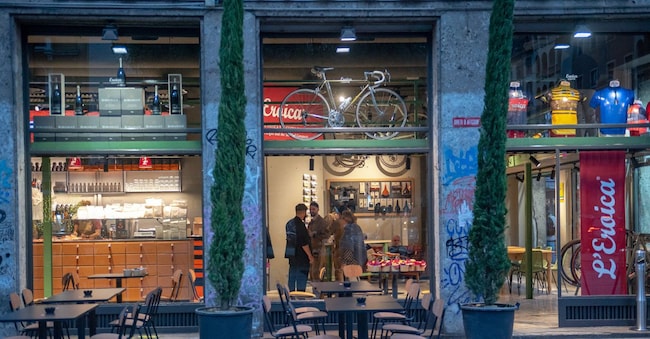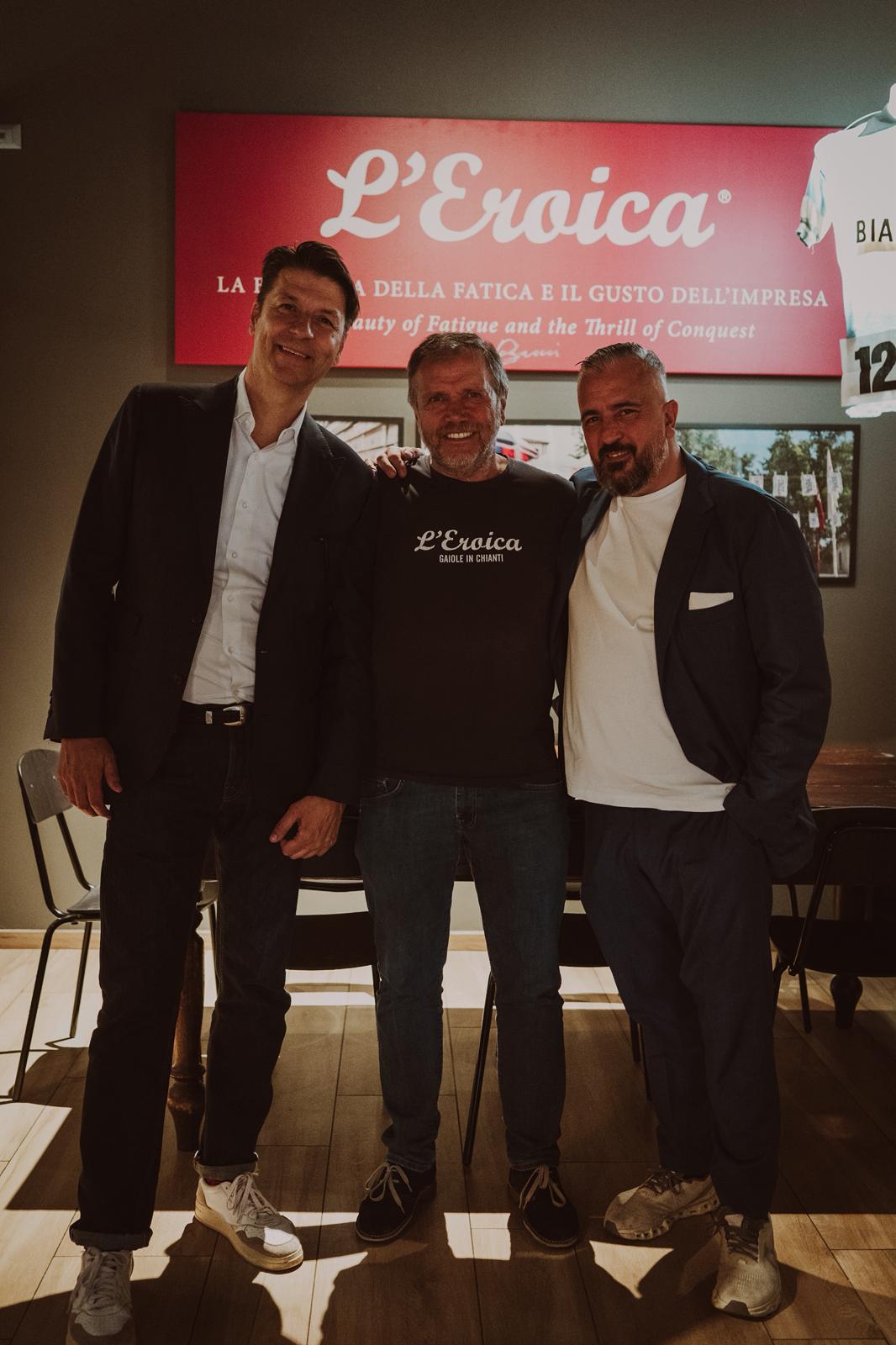Vintage cycling conquers the cities: Milan relaunches the Caffè Eroica race.


The second location has opened in the Lombard capital, ready to land in CityLife in the spring and then expand to other cities and also aim abroad: an event and a two-wheeled story that have given life to a brand with a turnover of three million and a half million customers.
Over the weekend, over eight thousand cyclists will bring the classic Eroica to life, the original one born in Gaiole in Chianti in 1997. But in total, twenty thousand people take part every year in the various events in Italy and around the world which exploit the brand of the non-competitive race which has given new life to the dirt roads of the Sienese hills and to thousands of vintage bicycles with gear shifters on the frame and external brake cables above the handlebars.

Eroica president Nicola Rosin, creator Giancarlo Brocci, and Caffè Eroica manager Ivan Totaro
These, along with the revival of wool jerseys, clothing, and historic Italian and international cycling brands from the "heroic" era of cycling, are the hallmarks behind the success of a brand that has become an icon of "Made in Italy" throughout the world, celebrating sport, culture, and Italian cuisine. This model is replicated every day on the busy streets of a metropolis like Milan with Caffè Eroica, the network of cafés created to bring the values of mobility, well-being, and sustainability of the event to the world. This year, approximately half a million people pass through, on bicycles or on foot—rarely by car—to experience a taste of the culture that cycling continues to embody.

Caffè Eroica doubled its presence in the Lombardy capital just before the summer, opening a second location in the Bocconi area, joining its historic location on Viale Tunisia, continuing the expansion that began with its first location in central Padua. A new location in the iconic CityLife park of the new Milan was also planned, with a dedicated design structure, but the project was delayed by problems surrounding the Generali skyscraper, and now the focus is on next spring.
Meanwhile, growth continues: "I've received several expressions of interest from cities like Trieste, Turin, Verona, and Bergamo, which we're evaluating. The goal is to reach seven to eight locations in Italy by the end of 2026. Meanwhile, we're also targeting international markets, and Spain could be our first international destination," says Ivan Totaro, an entrepreneur with extensive experience in the sector who has dedicated himself wholeheartedly to the brand after selling the Hamerica chain and joining the Eroica group. This reflects the motto adopted by the two-wheeled event: "The beauty of effort and the joy of achievement."

Cycling, after all, is about movement and competition, but always with a social dimension. It's rare to ride alone, and often the ride is accompanied by a stop at a restaurant, a delicious pasta dish, and a hearty glass of wine. This is also true of the Eroica di Gaiole, which, as always, accompanies the effort and the challenge with numerous refreshment stops featuring ribollita, tripe, beans, bread and olive oil, pecorino cheese, and Chianti.
L'Eroica itself has its roots in a bar. The inventor of the vintage event, Giancarlo Brocci, recalls how his love for cycling began among the tables of the Barrino, one of the centers of Gaiole's social life, where on Monday mornings he would read all the newspapers, from La Nazione to La Gazzetta, featuring Sunday's sporting exploits, which back then, in the 1960s, focused not only on football but also on two wheels, both motorized and, above all, pedal-powered. The era of the Coppi-Bartali duel was over, but Eroica cycling continued to spark discussion and divide the popular masses, with the Anquetils, Gimondis, and Merckxes, who inspired dreams with their rides on mostly Italian bikes. And in Tuscany, two wheels were an institution.
It was there, in the rooms next to his father's pump, that Brocci's passion for a romantic, black-and-white form of cycling was born, one marked by sweat and feats, by legs constantly on the pedals and expert hands fine-tuning wheels and gears, by frames adjusted the night before the race. It's the same cycling he revived in Gaiole and then replicated in Italy and around the world, like a celebration built around the insight that cycling—with its history and stories, its culture of hard work, its dirt roads, and its unique aesthetic—can inspire a different vision of sport, one that becomes a revitalization of local communities, of slow and human-scale tourism, of a life of toil and achievement.
"I believe that the Eroica brand's DNA embodies exactly all the values any brand is looking for right now: sustainability, listening, well-being, giving back, and a sense of belonging. Giancarlo says that the Eroica belongs to no one, but to everyone, in the sense that it's an Italian heritage. I truly believe this," says Totaro, whose goal is to bring those same values to the Eroica Cafés: "Those who come to us enter the Mecca of cycling, and are captivated by a history and an Italian spirit that are hard to find."
The restaurants therefore strive to embody those values: the Milanese venues house the private collection of historic Colnago bicycles, a universal symbol of the history of Italian design and sport. The cuisine is an expression of tradition and quality, made with select ingredients and traditional Italian recipes. At the same time, "employees must embrace the responsibility of conveying the brand through kindness, a welcoming attitude, and a willingness to help."

It may be a coincidence, but Caffè Eroica locations are never the result of chance: while the Barrino in Gaiole was next to a gas station, the Milanese location on Viale Tunisia replaced a car accessories shop and is located along the bike path, just a few dozen meters from Corso Buenos Aires, which has become a symbolic—and controversial—place for the new mobility in the Lombardy capital. Via Tabacchi, a short distance from Bocconi University, is next to the workshop of an auto electrician who is a great bicycle enthusiast, with a career as a racer, which his son also continued. The next location will be in the heart of the CityLife green area, an emblem of a more livable and human-scale Milan.
Business is poised to take off. This year, the contribution from the second Milanese location was limited, having arrived just before the summer, but it still allows the company to close the year with a turnover of over three and a half billion euros, compared to three billion last year, with "a double-digit EBITDA, very attractive by restaurant sector standards," Totaro comments. If the schedule is met, the opening of four to five new locations in 2026 will ensure business expansion.
That this is a truly unique model is also confirmed by its clientele, a good fifth of which are cyclists in uniform who gather here on Saturdays and Sundays before or after their weekend ride. A third are tourists, including foreigners, drawn by the history and word of mouth. The rest are locals and families, parents and kids, traditional patrons, drawn by the allure of the history of heroic cycling that permeates these venues, the hard work and the feats, ready to hop on two wheels themselves.
News and insights on political, economic, and financial events.
Sign upilsole24ore





